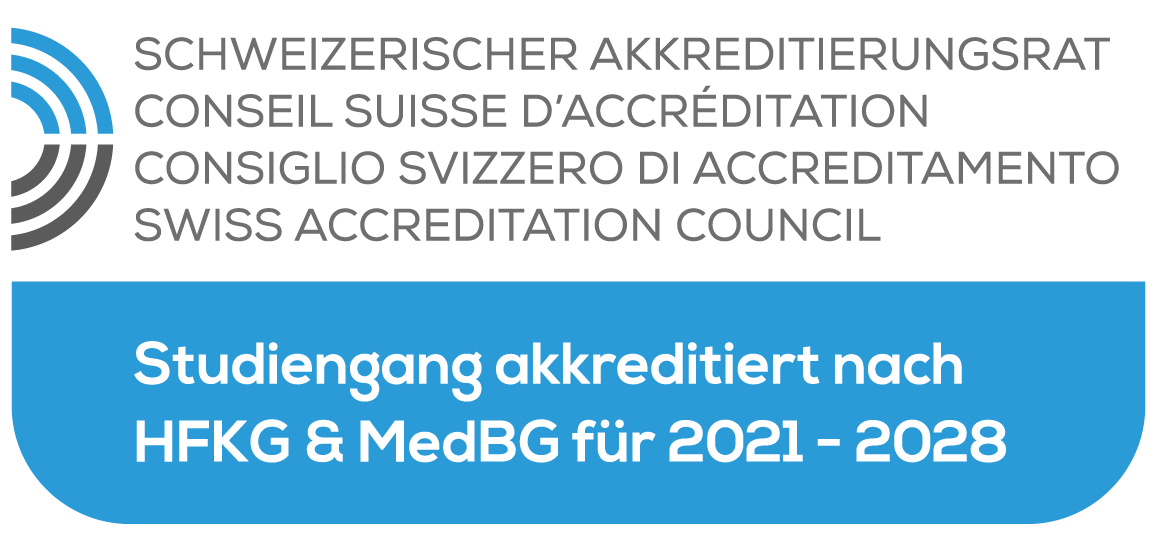Bachelor in Human Medicine
The first year of study comprises basic courses in physics and chemistry, an introduction to the organ systems and the fundamentals of human biology (cells, genetics, transmission and processing of biological information, development, structural biochemistry and metabolism). The systematic and in-depth teaching of organ systems begins in the second semester and continues in the second and third years of study. In the second year, the focus is on the morphological and functional principles, in the third year on understanding the mechanisms underlying diseases. The third-year programme also includes the basics of pharmacology, medical microbiology and radiology. In addition, students are introduced to individual clinical specialities (paediatrics and gynaecology; medicine of the ageing person, psychiatry).
Bachelor graduates are proficient in the basics of medical dialogue, clinical examination and simple diagnostic and therapeutic procedures (resuscitation, wound suturing, injections, etc.).
Bachelor of Medicine
Study languages
German and French
Programme structure
180 ECTS credits
6 semesters full-time
Start of studies
September
Additional information

-
Teaching and learning methods / study languages
contribute to the acquisition of the necessary knowledge and understanding of the basic concepts.
Problem-orientated learning (POL) is a form of small group teaching. Problems relating to basic medicine are presented to the students. They then have to identify the problems in group work and self-study, define the learning objectives, acquire the necessary knowledge and present solutions and results. In the third year, they are introduced to clinical reasoning in the clinical case seminars.
Practical courses illustrate the theoretical knowledge acquired in the lectures. They give students the opportunity to carry out experiments in real-life situations, applying a wide range of specific techniques, training their sense of observation and practising critical analysis and interpretation of results. The practical courses in Biochemistry and Integrative Physiology are complemented by colloquia.
In the clinical competences, different learning situations are applied according to the given objectives and the level of training: exercises between students, simulations involving dummies and simulated patients as well as real clinical situations. In the third year, students complete a four-day internship in a GP practice.
Lessons are taught partly in German and partly in French
-
Credit points and examinations
Regulations for obtaining the Bachelor of Medicine.
Please note (Art. 7 para. 2): The ECTS credits needed to pass the first year of study must be acquired by the end of the 4th semester in accordance with Art. 16 Calculation of ECTS Credits. Students who do not fulfil this requirement will be definitively excluded from studying human medicine at the University of Fribourg. This corresponds to a definitive failure of this degree programme (Art. 19).
The modalities of the assessment of the individual teaching units of the BMed are described in the Appendix to the curriculum.
All further information regarding BMed examinations is published on Moodle.
-
Further studies (MMed)
After completing their Bachelor degree, students continue their studies at Master level in Fribourg or at one of the medical faculties in Switzerland with which the University of Fribourg has a convention for the transfer of students.
The number of study places in the MMed programme at the University of Fribourg is limited to 40.
The number of Master's degree places reserved for UniFr BMed holders at partner universities is set out in inter-university agreements.
- University of Basel: 15
- University of Bern: 35
- University of Zurich: 35
- Università della Svizzera italiana (USI) : 5
The allocation of MMed study places at the UniFR and at other universities takes place at the beginning of the thrid year of study.
-
Nursing internship
uninterrupted, 4-week full-time nursing internship (in accordance with the BMed study plan). As a rule, the internship may not have been completed more than one year before the start of the programme and must have been completed at the latest before the final certificate is issued (end of the 3rd year of study)
-
The student must organise an internship themselves. The Section of Medicine does not have a list of internship places.
-
The internship can be completed in an acute or long-term care institution in Switzerland or abroad.
-
During the internship, the intern is under the supervision of a person who works in the field of nursing. The trainee carries out simple tasks related to the care and support of patients.
-
At the end of the placement, the trainee receives a confirmation from the institution with the date and duration of the placement and a brief description of the work carried out. The Section of Medicine does not provide any forms for this purpose.
-
Students who are doing their military service with the medical forces or who have already completed training in the healthcare sector (nurse, ambulance driver) are exempt from this internship.
If you have any questions
-
